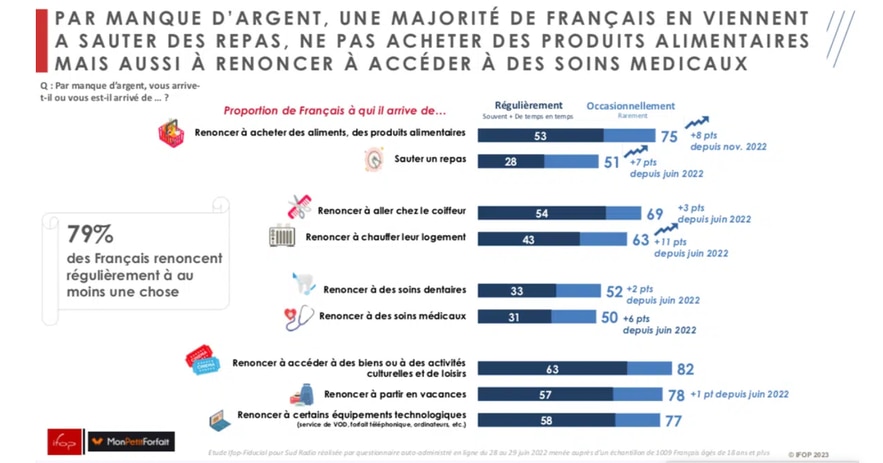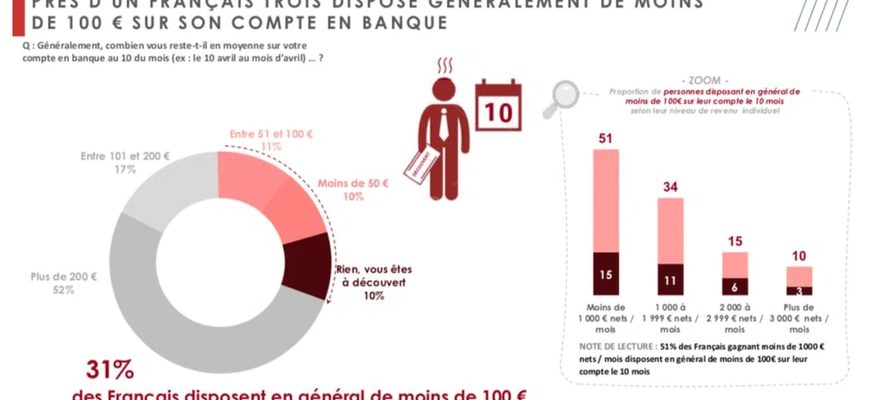Reduction of the food budget and health expenses, increase in depressive anxiety disorders… In a study published this Thursday, June 1 for the MonPetitForfait site, Ifop documents the multiple effects of financial insecurity caused by inflation, located in May to 5.1% over one year, which still weighs on the French population. The alarming figures revealed by the survey “show that the financial anxiety of the French, far from being an irrational feeling, is indeed the fruit of a real deterioration in their purchasing power, not without worrying consequences for their bodies as well as their their minds,” points out the polling institute.
Many indicators are in the red, and much more negative than the figures observed during the last financial crisis of 2008. Currently, 56% of French people admit to having difficulty living on their household income, a significant increase compared to to January 2023 (49%). This is particularly the case for two-thirds (65%) of French people personally earning less than 2,000 euros net per month, “i.e. the income threshold set to receive inflation compensation until February 2022”, notes Ifop.
© / FIFG
Very concrete illustration of these difficulties: when the 10th of the month comes, “that is to say after the deduction of “constrained” expenses from bank accounts”, 31% of French people find themselves with a “rest to live on” of less than 100 euros in their bank account. 10% of them are even overdrawn. These financial difficulties affect, according to the study, all aspects of their daily life, from the most practical to the physical and mental well-being of the population.
Food and health sacrificed
To cope with financial difficulties, some families are forced to give up part of their essential expenses, sometimes at the expense of their health. More than one in two French people (58%) have reduced their food expenditure for financial reasons over the past twelve months. This is twice as much as the 29% measured by Ifop in 2007. Worse still: for lack of money, one in two French people even ends up “skipping meals” regularly or occasionally, an increase of 7 points since June 2022.
Another direct impact of this drop in purchasing power on health: 41% of French people have postponed certain health expenses over the past 12 months. This is almost twice as much as fifteen years ago during the last inflationary crisis.

© / FIFG
Some secondary expenses related to their physical well-being are also trimmed. The subscription to a gym for example (40%) is the first type of contract that the French would terminate if they could, from June 1. Similarly, two out of three French people (69%, +3 points since June 2022) sometimes give up going to the hairdresser for lack of money.
Mental health, the hidden effects of inflation
Anxiety, suicidal thoughts, depression… Beyond the direct effects caused by inflation on practical and daily life, the consequences of financial instability on the mental health of the French are numerous, according to the Ifop study. Financial insecurity and psychological distress also appear “linked if we judge by the proportion of French people with less than 100 euros on the 10th of the month in the ranks of people affected by suicidal thoughts: 47%, i.e. twice more than among those who never suffer from it (28%)”, notes the study.
This characteristic is also found in the share of French people who are unable to pay the costs of their accommodation. They are now 34% in France, compared to 29% in October 2021. Among the French “very often” in this situation, 2% of them are exposed to the risk of suicide, i.e. three times more than among people who do not are never in difficulty (6%). Anxio-depressive disorders are therefore much more frequent among the households most in difficulty, “whatever the indicator used”.
Faced with these increasingly serious consequences in all areas, the French people questioned are strict with the government. Three quarters of those questioned thus judge “that the Borne government is not doing enough to fight against the rise in prices”. A figure which has however improved compared to October 2022, when 82% of French people considered its action insufficient.
Ifop study for MonPetitForfait carried out by self-administered online questionnaire from May 5 to 9, 2023 with a sample of 1,525 people, representative of the French population aged 18 and over.
